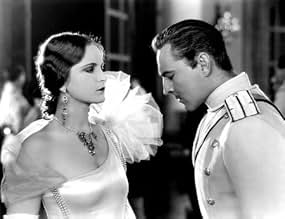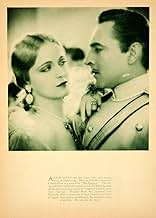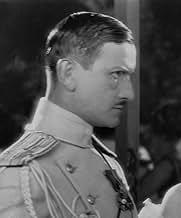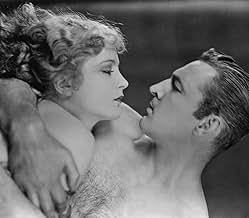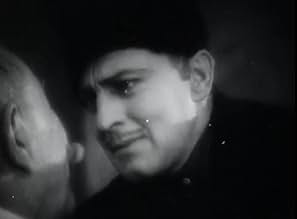In Czarist Russia, a peasant officer, resented by the aristocrats, falls in love with a princess.In Czarist Russia, a peasant officer, resented by the aristocrats, falls in love with a princess.In Czarist Russia, a peasant officer, resented by the aristocrats, falls in love with a princess.
- Won 1 Oscar
- 4 wins total
John Bleifer
- Soldier
- (uncredited)
Albert Conti
- Commission Board Member
- (uncredited)
Gregory Gaye
- Officer
- (uncredited)
Lena Malena
- Tamara's Friend
- (uncredited)
Michael Mark
- Soldier
- (uncredited)
Dick Sutherland
- Revolutionary Board Member
- (uncredited)
Wilhelm von Brincken
- Commission Board Member
- (uncredited)
Featured reviews
Enjoyable historical drama in which The Great Profile plays a Russian peasant who rises to the rank of Lieutenant immediately before the revolution only to find himself shunned by his fellow officers and the haughty princess he falls for. Fine chemistry between Barrymore and the beautiful German actress Camilla Horn helps paper over most of the film's meagre flaws.
A really magnificent movie with great performances. Don’t get caught in the political aspects of the movie, because I think that you will loose the beauty of the story. So aside from that the movie takes place in Russia the days of the Czars. A sergeant from the lower class tries to win a promotion to lieutenant which he rightfully deserves. But it’s hard, not to say impossible for someone from the lower class to get promoted and to be accepted by the aristocrats. The situation gets more complicated when the handsome Sergeant Ivan Markov falls in love with the Princess. But this are the last days of the Czarist Russia and the times are dangerous. An unbelievably captivating movie, the first time I saw it I couldn't get it out of my mind. I had to see it a second time too and a third… this movie leaves a mark! Even though there are only few months ago that I saw it, it is already one of my favorites. It has great performances from great actors like John Barrymore, Camilla Horn, Louis Wolheim and all the others and great directing work. I think you will fall in love with this movie if you see it. I have seen films with John Barrymore but this movie made me to truly appreciate him for a strange reason. It had great energy and emotion from the story and the performances of the actors.
I can't wrap my mind around the fact that Barrymore was in his forties when he made this film. He looks fit and fantastic, the true matinée idol. This is due in no small part to Rosher's astounding photography. This is a crazy, obsessional soap that may turn some people off, but John B. has some beautiful, moving moments that give me goosebumps. He was clearly still able to give his all at this point, and he does so here. His tearful scenes are believable and so well done. Camilla Horn was stunning and looked great with him, but she's so wooden that it dulls the effect a bit. Still, she had a long career in Germany, so I guess she couldn't have been so bad. Ivan is one big grey area when it comes to morality, and Barrymore conveys that very well.
I wish he could have pulled it together long enough to save his career and life from the self-parodying buffoonery that he sank into as he dissipated. He breaks my heart on many different levels.
I wish he could have pulled it together long enough to save his career and life from the self-parodying buffoonery that he sank into as he dissipated. He breaks my heart on many different levels.
'Tempest' gives John Barrymore plenty of chances to show his left profile. The plot -- utmost tosh, about a peasant cavalry officer obsessed with Princess Tamara during the Russian revolution -- doesn't stand up to analysis. Suffice it to say that this is one of those movies where a man keeps harassing a woman until she falls in love with him.
As Tamara, the haughty White Russian princess, Camilla Horn makes a magnificent entrance on horseback, riding sidesaddle in a form-fitting outfit with gauntlet gloves. Barrymore acquits himself well with a ridiculous script. There's one painful scene in which Lieutenant Markov (Barrymore) sups large quantities of booze to show how manly he is. Knowing what alcohol did to Barrymore's life and career, I cringe when I see him drinking on the screen.
Among the ridiculous elements is Boris de Fast as a gap-toothed Bolshevik whose ability to be conveniently present during all the plot twists (even surreptitiously entering a military stockade) borders on the supernatural. Ullrich Haupt, as Barrymore's villainous superior officer, is splendidly hissable in a role that seems tailored for Erich von Stroheim. Character actor Michael Mark plays one of the cavalry troopers: no dialogue, no business, but his distinctive facial structure calls attention to itself. Louis Wolheim supplies a bit too much comic relief as the bulbous and bull-like Bulba: I guess he must be Taurus Bulba. Wolheim plays a cavalry sergeant, but his immense bulk makes him implausible in the role; Wolheim is built more like an infantryman.
By far, the greatest appeal of this movie is Charles Rosher's dazzling camera-work, supplemented by the usual brilliant production design of William Cameron Menzies. The opening scene is a travelling shot of a military garrison: the camera is clearly panning across models, but they're as exquisitely detailed as one of those miniature villages that used to be so popular in Britain. Eventually the camera turns round a corner to show men walking past full-scale buildings ... but the cut is so well done, it's nearly seamless. Elsewhere, there's a splendid subjective shot through the bottom of an upturned glass ... and a fine example of double-exposure as the delirious Barrymore, rotting in the stockade, envisions his comrades in battle.
I was also impressed with the consistent use of dissolves whenever printed words, handwriting or inscriptions were shown on screen. As all the characters are Russian, we first see signs and captions written in Cyrillic, followed by a dissolve into English translations. (Compare this with 'The Last Command', made at a different studio this same year, in which a Russian telegram is shown on screen in English.) Just a couple of times in 'Tempest' the dissolve device is not used, and there's one bizarre shot in which a handwritten note reading 'Do not disturb' in English is posted on the same door as a sign reading 'Commissar' in Cyrillic. Still, I'm vastly impressed that the art department went to so much trouble.
Although the script is rubbish -- and I'm dismayed that the Bolsheviks are depicted favourably -- Barrymore's role has an impressive amount of moral ambiguity. Lieutenant Markov is basically moral and ethical, but he becomes obsessed with Princess Tamara ... and his behaviour degenerates accordingly. The script (and Barrymore) could have taken an easier route by contriving to make all of Markov's reversals a matter of circumstances rather than down to Markov's personal flaws.
Despite a howlingly implausible script, the visuals and the acting are so good in this film that I'll rate it 7 in 10.
As Tamara, the haughty White Russian princess, Camilla Horn makes a magnificent entrance on horseback, riding sidesaddle in a form-fitting outfit with gauntlet gloves. Barrymore acquits himself well with a ridiculous script. There's one painful scene in which Lieutenant Markov (Barrymore) sups large quantities of booze to show how manly he is. Knowing what alcohol did to Barrymore's life and career, I cringe when I see him drinking on the screen.
Among the ridiculous elements is Boris de Fast as a gap-toothed Bolshevik whose ability to be conveniently present during all the plot twists (even surreptitiously entering a military stockade) borders on the supernatural. Ullrich Haupt, as Barrymore's villainous superior officer, is splendidly hissable in a role that seems tailored for Erich von Stroheim. Character actor Michael Mark plays one of the cavalry troopers: no dialogue, no business, but his distinctive facial structure calls attention to itself. Louis Wolheim supplies a bit too much comic relief as the bulbous and bull-like Bulba: I guess he must be Taurus Bulba. Wolheim plays a cavalry sergeant, but his immense bulk makes him implausible in the role; Wolheim is built more like an infantryman.
By far, the greatest appeal of this movie is Charles Rosher's dazzling camera-work, supplemented by the usual brilliant production design of William Cameron Menzies. The opening scene is a travelling shot of a military garrison: the camera is clearly panning across models, but they're as exquisitely detailed as one of those miniature villages that used to be so popular in Britain. Eventually the camera turns round a corner to show men walking past full-scale buildings ... but the cut is so well done, it's nearly seamless. Elsewhere, there's a splendid subjective shot through the bottom of an upturned glass ... and a fine example of double-exposure as the delirious Barrymore, rotting in the stockade, envisions his comrades in battle.
I was also impressed with the consistent use of dissolves whenever printed words, handwriting or inscriptions were shown on screen. As all the characters are Russian, we first see signs and captions written in Cyrillic, followed by a dissolve into English translations. (Compare this with 'The Last Command', made at a different studio this same year, in which a Russian telegram is shown on screen in English.) Just a couple of times in 'Tempest' the dissolve device is not used, and there's one bizarre shot in which a handwritten note reading 'Do not disturb' in English is posted on the same door as a sign reading 'Commissar' in Cyrillic. Still, I'm vastly impressed that the art department went to so much trouble.
Although the script is rubbish -- and I'm dismayed that the Bolsheviks are depicted favourably -- Barrymore's role has an impressive amount of moral ambiguity. Lieutenant Markov is basically moral and ethical, but he becomes obsessed with Princess Tamara ... and his behaviour degenerates accordingly. The script (and Barrymore) could have taken an easier route by contriving to make all of Markov's reversals a matter of circumstances rather than down to Markov's personal flaws.
Despite a howlingly implausible script, the visuals and the acting are so good in this film that I'll rate it 7 in 10.
TEMPEST was the penultimate silent movie made by John Barrymore (ETERNAL LOVE directed by Ernst Lubitsch would be the last). The setting is not Shakespeare but takes place around the time of the Russian Revolution. The direction is credited to Sam Taylor who was best known for his comedies but a lot of it was shot by Lewis Milestone and visually it shows in many of the scene compositions and camera angles.
The film is primarily remembered today for Charles Rosher's cinematography, the sets by William Cameron Menzies, and as the Hollywood debut of German actress Camilla Horn (Murnau's FAUST). While not a great movie, it does have a lot to offer especially for silent movie and/or John Barrymore fans.
This version from Kino is part of a 4 DVD set of silent films by John Barrymore although it can be purchased separately (BELOVED ROGUE, DR JEKYLL & MR HYDE, SHERLOCK HOLMES make up the rest of the set). The picture quality is good and although it says it's from 35mm, a lot of it looks like 16mm to me. This print is courtesy of the Killiam Collection and contains some pro-Soviet bits that were later removed.
The piano score is by William Perry. Back in 2003, Film Preservation Associates released their DVD version through Image Entertainment. It is clearly from 35mm although a little scratchier and offers two separate soundtracks (the original Vitaphone discs and a piano score by Philip Carli) as well as a one reel home movie of Barrymore on his yacht. That's the one to own although this release comes in a close second...For more reviews visit The Capsule Critic.
The film is primarily remembered today for Charles Rosher's cinematography, the sets by William Cameron Menzies, and as the Hollywood debut of German actress Camilla Horn (Murnau's FAUST). While not a great movie, it does have a lot to offer especially for silent movie and/or John Barrymore fans.
This version from Kino is part of a 4 DVD set of silent films by John Barrymore although it can be purchased separately (BELOVED ROGUE, DR JEKYLL & MR HYDE, SHERLOCK HOLMES make up the rest of the set). The picture quality is good and although it says it's from 35mm, a lot of it looks like 16mm to me. This print is courtesy of the Killiam Collection and contains some pro-Soviet bits that were later removed.
The piano score is by William Perry. Back in 2003, Film Preservation Associates released their DVD version through Image Entertainment. It is clearly from 35mm although a little scratchier and offers two separate soundtracks (the original Vitaphone discs and a piano score by Philip Carli) as well as a one reel home movie of Barrymore on his yacht. That's the one to own although this release comes in a close second...For more reviews visit The Capsule Critic.
Did you know
- TriviaCarole Lombard was considered for the role of Princess Tamara.
Details
Contribute to this page
Suggest an edit or add missing content




